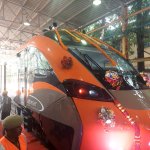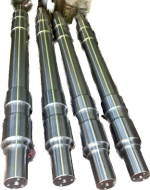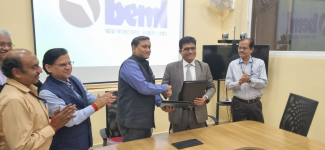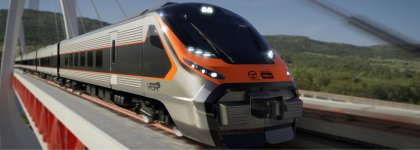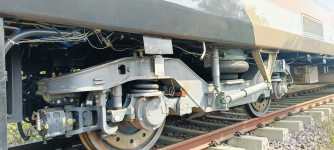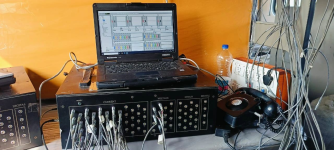High speed / Semi-High speed rail projects of Indian Railways
- Thread starter Ashwin
- Start date
You are using an out of date browser. It may not display this or other websites correctly.
You should upgrade or use an alternative browser.
You should upgrade or use an alternative browser.
What Is A Tilting Train And Why India's Getting 100 Of Them
India will get its first tilting train in the next two-three years, according to a senior official of Indian Railways. The technology enables trains to maneuver curves at increased speed, that too on regular tracks, just like a motorcycle on a winding road. Vande Bharat trains, manufactured in India, will be equipped with the technology by 2025 that will improve their speed. Such trains are now operational in 11 countries - Italy, Portugal, Slovenia, Finland, Russia, the Czech Republic, the UK, Switzerland, China, Germany and Romania.
"We will have tilting trains in the country. We will tie up with a technology partner for this. We will have this technology in 100 Vande Bharat trains over the next two to three years," news agency PTI quoted the Railways official as saying on Friday.
The Indian Railways has explored various options in the past regarding tilting trains, but has never finalised any detail. It also had discussions with Spanish manufacturer Talgo as well as the Switzerland government, PTI added.
How does a tilting train work?
When a train rounds a curve at speed, objects (and people) inside experience centrifugal force, which pushes them outwards.
The effect can cause luggage inside to slide, seated passengers to feel squashed and standing passengers to lose balance. These trains are designed to counteract the effect by tilting the carriages towards the inside of the curve, thus compensating the g-force.
According to Sweden-based KTH Engineering Sciences, there can be various mechanisms to neutralize the tilt force and achieve a balance. It further explains how motion sickness can be essentially eliminated by adjusting the timing of when the cars tilt.

What Is A Tilting Train And Why India's Getting 100 Of Them
Tilting trains are operational in 11 countries and an Indian Railways official said that Vande Bharat trains will also be equipped with this technology soon.www.ndtv.com
Actually, Speed constrain on Indian train is because of tracks and sharp curves rather than engine power. If we put proper track and manage curves, speed of all existing trains can also be increased. fencing, track quality and curve management can give capability to all existing trains.

Designed For 180 Kmph, Vande Bharat Trains Running At Average Speed Of 83 Kmph: RTI Reply
Vande Bharat Express, which is India's first semi-high speed train has been running at an average speed of much lower than 100 kilometre per hour (kmph)swarajyamag.com
Too conservative. It should run atleast 110 km on an average. Vande Bhart from A'bad to surat around 240 KM is managed in 2 hrs 10 minutes.
Bengaluru To Manufacture India's First High-Speed Train, Designed For 280 Kmph for the Mumbai-Ahmedabad Corridor
By V Bhagya Subhashini
Sep 20, 2024, 12:07 PM | Updated 12:15 PM IST
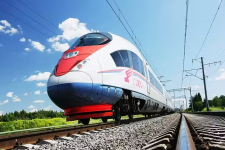
Due to high prices quoted by Japanese firms, the Indian government opted to manufacture these high-speed trains domestically.
Bengaluru, known for its technological advancements, is poised to make history by manufacturing India’s first high-speed train. On 5 September 2024, the Integral Coach Factory (ICF) issued a tender to build two state-of-the-art high-speed chair-car trains, designed to reach a top speed of 280 km/h and operate at 250 km/h.
After the tender closed on 19 September, BEML (formerly Bharat Earth Movers Limited) in collaboration with Medha Servo Drives, emerged as the sole bidder, setting the stage for India's leap into the high-speed rail era.
These trains will be part of the ambitious 508-km Mumbai-Ahmedabad High-Speed Rail (MAHSR) corridor, estimated to cost Rs 1.1 lakh crore.
Initially, the corridor was planned to feature Japanese Shinkansen E5 trains, capable of reaching up to 350 km/h. However, due to the high prices quoted by Japanese firms, the Indian government opted to manufacture these high-speed trains domestically.
An official from the railway ministry revealed that BEML, known for its car body manufacturing expertise, will partner with Medha Servo Drives, which has a proven track record in propulsion systems, including the Vande Bharat trains.
“Medha’s propulsion system, which powers the Vande Bharat trains running at 160 km/h, will now be enhanced to achieve 250 km/h,” said the official. The BEML-Medha consortium plans to consult a European design firm to ensure the new trains meet global standards.
The first train, with a design speed of 280 km/h and an operational speed of 250 km/h, is expected to roll out by December 2026. Trials will begin on the Surat-Bilimora section of the MAHSR corridor.
The train will consist of seven cars, featuring a standard 3+2 seating arrangement and one executive car with a 2+2 configuration, offering a seating capacity of approximately 174 passengers. The number of cars could increase to 12 or even 16, depending on future demand.
Medha will handle the development of the Train Control and Management System (TCMS) and propulsion systems from its Hyderabad facility, while BEML will oversee the final assembly in Bengaluru.
“After successful trials, we anticipate more orders for additional trainsets, not only for the Mumbai-Ahmedabad route but also for other high-speed corridors like Delhi-Varanasi, Mumbai-Hyderabad, and Bengaluru-Chennai,” the official added, reports Moneycontrol.
Targeting Export Markets
These trains are being built for standard gauge tracks, with the Indian government eyeing export markets in Southeast Asia and Africa.
BEML and Medha's collaboration on this project is a significant step towards enhancing India's capability to build high-speed rail infrastructure, potentially paving the way for more domestic and international orders.
The current tender, estimated to be valued between Rs 200-250 crore per train, is expected to be finalised within a week. Though the initial order is small, BEML is confident of completing the manufacturing within 2.5 years, setting a new benchmark for India’s railway sector.
This domestic development of high-speed trains could mark a turning point in India's rail history, reducing dependency on foreign suppliers and showcasing India’s growing technological prowess in high-speed rail manufacturing.
https://swarajyamag.com/infrastruct...or-280-kmph-for-the-mumbai-ahmedabad-corridor
Bengaluru To Manufacture India's First High-Speed Train, Designed For 280 Kmph for the Mumbai-Ahmedabad Corridor
By V Bhagya Subhashini
Sep 20, 2024, 12:07 PM | Updated 12:15 PM IST
View attachment 36443
Due to high prices quoted by Japanese firms, the Indian government opted to manufacture these high-speed trains domestically.
Bengaluru, known for its technological advancements, is poised to make history by manufacturing India’s first high-speed train. On 5 September 2024, the Integral Coach Factory (ICF) issued a tender to build two state-of-the-art high-speed chair-car trains, designed to reach a top speed of 280 km/h and operate at 250 km/h.
After the tender closed on 19 September, BEML (formerly Bharat Earth Movers Limited) in collaboration with Medha Servo Drives, emerged as the sole bidder, setting the stage for India's leap into the high-speed rail era.
These trains will be part of the ambitious 508-km Mumbai-Ahmedabad High-Speed Rail (MAHSR) corridor, estimated to cost Rs 1.1 lakh crore.
Initially, the corridor was planned to feature Japanese Shinkansen E5 trains, capable of reaching up to 350 km/h. However, due to the high prices quoted by Japanese firms, the Indian government opted to manufacture these high-speed trains domestically.
An official from the railway ministry revealed that BEML, known for its car body manufacturing expertise, will partner with Medha Servo Drives, which has a proven track record in propulsion systems, including the Vande Bharat trains.
“Medha’s propulsion system, which powers the Vande Bharat trains running at 160 km/h, will now be enhanced to achieve 250 km/h,” said the official. The BEML-Medha consortium plans to consult a European design firm to ensure the new trains meet global standards.
The first train, with a design speed of 280 km/h and an operational speed of 250 km/h, is expected to roll out by December 2026. Trials will begin on the Surat-Bilimora section of the MAHSR corridor.
The train will consist of seven cars, featuring a standard 3+2 seating arrangement and one executive car with a 2+2 configuration, offering a seating capacity of approximately 174 passengers. The number of cars could increase to 12 or even 16, depending on future demand.
Medha will handle the development of the Train Control and Management System (TCMS) and propulsion systems from its Hyderabad facility, while BEML will oversee the final assembly in Bengaluru.
“After successful trials, we anticipate more orders for additional trainsets, not only for the Mumbai-Ahmedabad route but also for other high-speed corridors like Delhi-Varanasi, Mumbai-Hyderabad, and Bengaluru-Chennai,” the official added, reports Moneycontrol.
Targeting Export Markets
These trains are being built for standard gauge tracks, with the Indian government eyeing export markets in Southeast Asia and Africa.
BEML and Medha's collaboration on this project is a significant step towards enhancing India's capability to build high-speed rail infrastructure, potentially paving the way for more domestic and international orders.
The current tender, estimated to be valued between Rs 200-250 crore per train, is expected to be finalised within a week. Though the initial order is small, BEML is confident of completing the manufacturing within 2.5 years, setting a new benchmark for India’s railway sector.
This domestic development of high-speed trains could mark a turning point in India's rail history, reducing dependency on foreign suppliers and showcasing India’s growing technological prowess in high-speed rail manufacturing.
https://swarajyamag.com/infrastruct...or-280-kmph-for-the-mumbai-ahmedabad-corridor
Here's an interesting interview with Sudhanshu Mani who conceived & oversaw the project which gave us the Train 18. He's painted a very bleak picture of our attempts to leap frog into building the 250 km / hr Bullet Trainset .
Do listen to his reasoning as well as his views on the other misteps the IR has taken / is taking.
Disgusting step by babus and politicians, after spending tens of thousands of crores on the project, they are handicapping the train for saving few tens of crores. From World class Shinkasen at 350 KMPH to BEML at 250 KMPH. Even 250 speed is ambitious, most probably will cap at 200 and then give excuses that it is better for safety etc
This is probably the most rational step that has ever taken by Railways. They didn't go for extreme ends of either importing full trainsets or mindlessly attempting HSR from get go. Lets say we import Shinkansen completely, we anyhow need to start somehow in future regarding HSR right? Japanese don't transfer ToT and if there is anything in our part, it would be screwdrivergiri.Disgusting step by babus and politicians, after spending tens of thousands of crores on the project, they are handicapping the train for saving few tens of crores. From World class Shinkasen at 350 KMPH to BEML at 250 KMPH. Even 250 speed is ambitious, most probably will cap at 200 and then give excuses that it is better for safety etc
On One hand people cry if Gormint imports something fully and on other hand the same bunch cry if they try Atmanirbhar Bharat.
Something wrong with the report. I dont think they can somehow run this imaginary tainsets on HSR line. Lets wait for more details.Disgusting step by babus and politicians, after spending tens of thousands of crores on the project, they are handicapping the train for saving few tens of crores. From World class Shinkasen at 350 KMPH to BEML at 250 KMPH. Even 250 speed is ambitious, most probably will cap at 200 and then give excuses that it is better for safety etc
No, it's not. This project is worth $20+ billion and 80% of it is funded by JICA as agreed a decade ago. The buzzwords like Atmanirbhar and MII do not apply on the trainsets. No Indian company is competent enough to deliver anything close to Shinkansen. After all the investment, redoing trainsets means a decade more of waiting and billions more in costs due to delays. All this for what?.This is probably the most rational step that has ever taken by Railways. They didn't go for extreme ends of either importing full trainsets or mindlessly attempting HSR from get go. Lets say we import Shinkansen completely, we anyhow need to start somehow in future regarding HSR right? Japanese don't transfer ToT and if there is anything in our part, it would be screwdrivergiri.
On One hand people cry if Gormint imports something fully and on other hand the same bunch cry if they try Atmanirbhar Bharat.
Civilian projects don't work like the military in terms of asking for Technology Transfer. All technology is accessible with enough investment through partnerships. We will be and should be importing Shinkasen at whatever cost then iterate over. Which is what even the chinese did.
The WAP5 imported in 1990s were fit for 220kmph operations.Disgusting step by babus and politicians, after spending tens of thousands of crores on the project, they are handicapping the train for saving few tens of crores. From World class Shinkasen at 350 KMPH to BEML at 250 KMPH. Even 250 speed is ambitious, most probably will cap at 200 and then give excuses that it is better for safety etc
With the tracks and signalling being taken care of, 250kmph will easily be taken care of.
The issue however will be of safety, given that how good the Japanese Bullet trains are.
BEML corporate film on the Making of Vande Bharat Sleeper Train:
View attachment Making of Vande Bharat Sleeper Train-beml.mp4
View attachment Making of Vande Bharat Sleeper Train-beml.mp4
Railway Minister visits Japan to resolve bullet train issues ahead of Modi visit this year
Officials say that while the entire land acquisition in Gujarat and Maharashtra had been completed, the deadlock over costs for supplying rolling stock or train sets and signalling systems still persists
Senior officials led by Union Railway Minister Ashwini Vaishnaw undertook a three-day trip to Japan in September to resolve a number of problems that have resulted in a deadlock between India and Japan over Prime Minister Narendra Modi’s pet project — the bullet train. Sources said, among the problems they discussed were Japan’s insistence on Japanese vendors for the trains and signalling systems, as well as costing and timing estimates for the completion of the project. Member (Infrastructure) Railway Board, Anil Kumar Khandelwal, and Vivek Kumar Gupta, Managing Director of the National High Speed Rail Corporation Ltd (NHSRCL), also accompanied Mr. Vaishnaw, sources said, as pressure to complete construction milestones in the project grows ahead of Prime Minister Narendra Modi’s visit to Tokyo for the annual summit later this year.
Officials said that while the entire land acquisition in Gujarat and Maharashtra had been completed, and 215 km of viaduct of the total 508 km distance was completed, the deadlock over costs for supplying rolling stock or train sets and signalling systems still persists.
“Japan which is providing all the technical support and technology for running the bullet trains is keen that the train sets and the signalling system be purchased from Japanese suppliers only,” sources in the know told The Hindu.
According to Japan International Cooperation Agency (JICA) loan conditions, only Japanese manufacturers such as Kawasaki and Hitachi can participate in the bid.
The increase in the project’s costing is also becoming another issue. According to NHSRCL figures, an expenditure of up to ₹60,372 crore (unaudited) has already occurred between FY 2020-21 to FY 2023-24, against a total outlooked budget of ₹1.08 lakh crore.
“A majority of this cost has been spent in creating infrastructure for the bullet train like constructing the viaduct, girder casting and launching, laying rail level slabs and so on. This leaves increasingly small margin for spending on buying the train sets and setting up the signalling systems,” officials said indicating the project costs will further escalate.
The train, built with Japan’s Shinkansen technology, that was first launched exactly 60 years ago in Japan (on October 1, 1964), will run at lightning speed, about 320 km/hour between Mumbai and Ahmedabad, covering the total distance in about 3 hours, and was due to begin operations in 2023.
Earlier this year, Mr. Vaishnaw said a 50-km section between Surat and Bilimora was likely to begin operations in 2026, but officials say the latest issues could push the launch further. In addition, construction of a 21 km-long tunnel between Mumbai BKC and Shilphata, including 7 km undersea tunnel at Thane creek, which was awarded in May 2023, will take at least five years to complete.
Well said. Pick a lane and stick to it. Shinkansen trains are a costly affair and the way I see it, it was a rational call. Create a 300 kph trainset and try to deploy it.This is probably the most rational step that has ever taken by Railways. They didn't go for extreme ends of either importing full trainsets or mindlessly attempting HSR from get go. Lets say we import Shinkansen completely, we anyhow need to start somehow in future regarding HSR right? Japanese don't transfer ToT and if there is anything in our part, it would be screwdrivergiri.
On One hand people cry if Gormint imports something fully and on other hand the same bunch cry if they try Atmanirbhar Bharat.
Rather than going for costly bullet train, We should work on development of local semi high speed trains and track improvement and fencing. This will be a very cost effective option. If we improve track and do fencing, we can increase the speed of our other trains as well. With Aerodynamic shaping and coaches built from light material, lots of energy can be saved. We can run double Deckers to accommodate more passengers and make travel cost effective.
We should make one dedicated research institute for railway like DRDO. It can be RRDO with some really smart engineers.
We should make one dedicated research institute for railway like DRDO. It can be RRDO with some really smart engineers.
The problem with Indian Railways is never about Body Material or Aerodynamic Shape or Fencing or Track conditions but its DAMN track shape. Most of them are frequently curved which means Trains can't use their full potential. Ofcourse curves are elsewhere in HSR countries but they are like 2 or 3 per 100km or such and gentle along radius of curvature which enables high speed while turning unlike here.Rather than going for costly bullet train, We should work on development of local semi high speed trains and track improvement and fencing. This will be a very cost effective option. If we improve track and do fencing, we can increase the speed of our other trains as well. With Aerodynamic shaping and coaches built from light material, lots of energy can be saved. We can run double Deckers to accommodate more passengers and make travel cost effective.
We should make one dedicated research institute for railway like DRDO. It can be RRDO with some really smart engineers.
BEML to build India’s first bullet train
By Twesh Mishra
ET Bureau
Last Updated: Oct 15, 2024, 05:20:00 PM IST
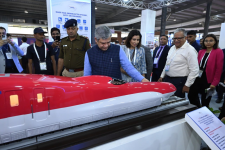
State-owned BEML will build India's first indigenously manufactured bullet trains for Rs 866.87 crore. In a statement to the exchanges, BEML said it has been awarded a contract for design, manufacturing, and commissioning two high-speed trainsets. Each train will have eight cars (coaches) in this order placed by Indian Railways production unit, Integral Coach Factory (ICF), Chennai.
BEML said these trains will be priced at Rs 27.86 crore per coach. The total contract value includes design cost, one-time development cost, non-recurring charges, onetime cost towards Jigs, fixtures, tooling and testing facilities.
The Railway Board was earlier relying on Japanese technology for the bullet trains to run on the line between Ahmedabad to Mumbai that’s being built. But India may now opt for indigenously developed trains for this route since talks with the Japanese are yet to reach finality.
BEML’s per coach cost is also far lower than Japanese estimates that wanted to bill India over Rs 46 crore per bullet train coach.
According to BEML, this infrastructure will be utilized for all future High-Speed projects in India.
“This project marks a significant milestone in India's high-speed rail journey and will see the first indigenously designed and manufactured trainsets with a test speed of 280 kmph,” BEML said. The Shinkansen E5 series bullet trains, which India wanted to deploy for the Mumbai-Ahmedabad route, can hit 320 kmph.
ET reported in April 2024 that India is preparing for home-made high speed or Bullet trains.
Globally, high-speed trains are those that ply at over 250 kmph such as the French TGV and the Japanese Shinkansen.
According to BEML, its trainsets will be built at the company’s Bengaluru rail coach complex and are scheduled for delivery by the end of 2026. It will feature a fully air-conditioned Chair Car configuration.
These trains will offer modern passenger amenities such as reclining and rotatable seats, special provisions for passengers with restricted mobility, and onboard infotainment systems.
BEML to build India’s first bullet train
By Twesh Mishra
ET Bureau
Last Updated: Oct 15, 2024, 05:20:00 PM IST

Synopsis
BEML has received a contract to design, manufacture, and commission India's first indigenous bullet trains. Each trainset will consist of eight cars. The project is part of India's high-speed rail initiative, aimed at enhancing train travel experience with modern amenities. The trains will be delivered by the end of 2026.
BEML has received a contract to design, manufacture, and commission India's first indigenous bullet trains. Each trainset will consist of eight cars. The project is part of India's high-speed rail initiative, aimed at enhancing train travel experience with modern amenities. The trains will be delivered by the end of 2026.
State-owned BEML will build India's first indigenously manufactured bullet trains for Rs 866.87 crore. In a statement to the exchanges, BEML said it has been awarded a contract for design, manufacturing, and commissioning two high-speed trainsets. Each train will have eight cars (coaches) in this order placed by Indian Railways production unit, Integral Coach Factory (ICF), Chennai.
BEML said these trains will be priced at Rs 27.86 crore per coach. The total contract value includes design cost, one-time development cost, non-recurring charges, onetime cost towards Jigs, fixtures, tooling and testing facilities.
The Railway Board was earlier relying on Japanese technology for the bullet trains to run on the line between Ahmedabad to Mumbai that’s being built. But India may now opt for indigenously developed trains for this route since talks with the Japanese are yet to reach finality.
BEML’s per coach cost is also far lower than Japanese estimates that wanted to bill India over Rs 46 crore per bullet train coach.
According to BEML, this infrastructure will be utilized for all future High-Speed projects in India.
“This project marks a significant milestone in India's high-speed rail journey and will see the first indigenously designed and manufactured trainsets with a test speed of 280 kmph,” BEML said. The Shinkansen E5 series bullet trains, which India wanted to deploy for the Mumbai-Ahmedabad route, can hit 320 kmph.
ET reported in April 2024 that India is preparing for home-made high speed or Bullet trains.
Globally, high-speed trains are those that ply at over 250 kmph such as the French TGV and the Japanese Shinkansen.
According to BEML, its trainsets will be built at the company’s Bengaluru rail coach complex and are scheduled for delivery by the end of 2026. It will feature a fully air-conditioned Chair Car configuration.
These trains will offer modern passenger amenities such as reclining and rotatable seats, special provisions for passengers with restricted mobility, and onboard infotainment systems.
BEML to build India’s first bullet train
India unlikely to import bullet train from Japan after failed price negotiations and change in project norms
India is unlikely to import Shinkansen, or bullet, trains from Japan, seven years after the launch of the ambitious Mumbai-Ahmedabad High-Speed Rail (MAHSR) corridor project. Instead, New Delhi has opted for a Make-in-India approach, awarding the contract in September to the BEML Ltd-Medha Servo Drives joint venture that manufactures the Vande Bharat trains.
"Negotiations with the Japanese government are still underway to import Shinkansen trains. However, talks have slowed down significantly in the last six months," an official told Moneycontrol. Both the governments are yet to arrive at a consensus regarding a price point for the Shinkansen trains and also on a definitive timeline to conduct test runs.
Though Minister for Railways Ashwini Vaishnaw, along with government officials, visited Japan in September to resolve the pending issues, talks remain inconclusive.
"Shinkansen trains' import to India is an expensive affair. Besides, their life-long maintenance will need to be carried out by Japanese companies. The maintenance will significantly add to the overall cost of the project," a second official said.
Despite these bottlenecks, Japan International Cooperation Agency (JICA) is still committed to fund Rs 59,396 crore for the project amid contours for the loan being renegotiated to ensure the completion of the ambitious joint venture (JV) is not delayed any further. Initially, the project, which was launched in 2017, was scheduled to be completed by December, 2023.
Emails sent to the Ministry of Railways remained unanswered till the time of the publication of the article.
Why did the negotiations break down?
The negotiations between the Indian and the Japanese government to procure Shinkansen trains have all but broken down over the price point to import them, inordinate delay in land acquisition and a change in technical norms of the JV.
The Japanese government felt that its Indian counterpart made the modifications to the track in order to reduce the cost of land acquisition.
"The Japanese government had requested the Indian authorities not to increase the elevated sections of the track. However, the plea was not adhered to," a retired former Railway board member told Moneycontrol. He put the Japanese government's request in perspective. The request was made on the basis that creating elevated section of the track would be time-consuming. Besides, it could be a risky proposition, leading to a probable collision between the train and people and roving cattle.
Earlier, elevated portion of the track was planned to cover 144 kilometres (km), which is around 28 per cent of the total track. Later, as per the revised plan, around 90 per cent of the track will be elevated.
The first official said a reduction in the price of land acquisition was one of the key reasons behind the rise in the elevated section of the track, which further delayed the project. Talks between the government and the farmers broke down over the land acquisition price, compelling the authorities to make a change in the project norms.
What is the price of a Shinkansen train?
India was all set to import Shinkansen trains from Japan, as JICA remains steadfast in its committment to fund the project.
In November, 2022, the National High Speed Rail Corporation Ltd (NHSRCL) had floated a rolling stock tender for the supply of 24 Shinkansen trains, which is worth Rs 11,000 crore.
However, the Hitachi-Kawasaki consortium had delayed bidding for the Shinkansen trainsets twice last year.
In 2018, the estimated cost of a 10-coach bullet train was Rs 389 crore. The maximum speed of the train is over 300 km per hour (kmph). By 2023, this estimated supply cost had increased to Rs 460 crore per trainset, officials said.
Though the Japanese consortium did submit a bid to supply the trains earlier this year, the rail authorities expressed their reservations over the 'inflated' price point.

Tale of two different Bullet Trains
Timeline to produce, import and install a Shinkansen train
"Importing [Shinkansen] trains from Japan will need a definite timeline, including the availability of the prototype, followed by a test run and the delivery of a trainset at a reasonable price point," the first official said.
Japanese companies are likely to need up to 25 months to make the prototype and another six months to carry out a test run. The elaborate process will delay the launch of the project till the middle of 2027, while the government keen to launch it by 2026, the official added.
Though the NHSRCL is gearing up for phased commissioning of the 352-km-long Gujarat leg operational by August, 2027, Union Railway Minister Ashwini Vaishnaw had in March 2024 had has announced that the country's first bullet train service will be launched by 2026 between Ahmedabad and Mumbai.
The Surat-Bilimora section on the 508-km-long corridor between Mumbai and Ahmedabad might be operational by July-August, 2026, Vaishnaw had said.
Vaishnaw had also said that the bullet train project in India would have made more progress if the previous Maharashtra government, led by Uddhav Thackeray, had expedited the approval process. He had cited that once the Eknath Shinde-led government took office, permissions were granted within 10 days.
New Indian high speed trains
The Integral Coach Factory (ICF) invited a tender on September 5 to manufacture two chair-car high-speed trains. The stainless steel carbody trains will have a maximum speed of 280 kmph and an operational speed of 250 kmph. The last date for submission of the bid was September 19.
"Only BEML has submitted the bid to manufacture two eight-car trainsets, and the tender will be finalised in a week. Since it is a small order for just two trainsets, other rolling stock manufacturers were not keen to participate. Our target is to complete the manufacturing in the next two and a half years," Rao had said.
While the exact amount quoted by BEML-Medha Servo Drives is still unclear, it is likely in the range of Rs 200-Rs 250 crore per train. These trains will operate on the MAHSR corridor, which is being developed by the NHSRCL.
Medha will develop a propulsion system capable of 250 Kmph, while BEML will develop the carbody structure to withstand such speed. BEML-Medha is expected to hire a design consultant from Europe for the project.
The 508-km MAHSR will connect Mumbai, Maharashtra, with Ahmedabad, Gujarat, through 12 stations at an estimated cost of Rs. 1.1 lakh crore. Initially, Japanese Shinkansen E5 trains, capable of running at a maximum speed of 350 kmph, were planned to operate on the line with an operational speed of 320 kmph and an average speed of 250 kmph.
Timeline for Bullet train project
In September 2017, Prime Minister Narendra Modi and his Japanese counterpart Shinzo Abe had laid the foundation stone of the ambitious bullet train project — connecting Mumbai with Ahmedabad.
The total cost of the project was set at Rs 1.08 lakh crore. Of that total, Rs 88,000 crore was earmarked for the actual construction work is to be funded by yen-denominated loans from the Japanese government with an annual interest rate of 0.1 per cent and repayable in 50 years.
JICA committed 80 per cent of the funding. According to the JICA loan conditions, only Japanese manufacturers such as Kawasaki and Hitachi would supply trains for the project.
Construction of the project began in 2020 across corridor spanning Maharashtra (155.76 km), Gujarat (384.04 km), and Dadra and Nagar Haveli (4.3 km), with an original completion timeline set for 2023. However, farmers' protests related to land acquisition have significantly delayed its progress.
In March 2024, the NHSRCL, which is overseeing the project, confirmed that all civil contracts in both Gujarat and Maharashtra had been awarded.
What is the project status?
The NHSRCL said it has completed 100 per cent land acquisition for the project across Gujarat, Maharashtra and Dadra and Nagar Haveli on January 8.
Vaishnaw also shared all 1389.49 hectares required for the project has been acquired.
According to the monthly progress report, the overall physical progress achieved is 57.4 per cent as against the target of 61.1 per cent with a shortfall of 3.7 per cent till October. On the financial front, the progress is 63.45.58 per cent with an expenditure of Rs 76,635.49 crore incurred up to end-October. Total expenditure in incurred in last financial year (FY) 2023-24 was Rs 9,246.26 crore.
According to the original schedule, the first bullet train with 10 coaches is expected to arrive from Japan before 2027 so that it can be operationalised between Vapi and Sabarmati in Gujarat by August, 2027.
E10 bullet train to debut in India and Japan simultaneously in 2030
India and Japan are set to introduce the latest iteration of the Shinkansen, the Alfa-X, also known as the E10, simultaneously in 2029-30. Originally set to receive the Shinkansen E5, India’s transition to the more advanced E10 signifies a significant leap forward in high-speed rail technology.
This strategic development, as per a report in The Hindustan Times, highlights the deep collaboration between India and Japan in the ambitious bullet train project, which aims to connect Ahmedabad and Mumbai, revolutionising rail travel between the two cities.
The Shinkansen (colloquial for bullet train) E5, with a top speed of 320 kmph, was India’s earlier plan for its high-speed rail system. However, the introduction of the Shinkansen E10 has been agreed upon, offering a much-improved version with a top speed of 400 kmph. The E5 series is a Japanese Shinkansen high-speed train operated by East Japan Railway Company on Tohoku Shinkansen services since March 5, 2011.
Japan’s willingness to launch the E10 model simultaneously in its homeland and in India signifies a historic move in high-speed rail innovation. India is expected to get two E10 bullet train models -- an unprecedented step highlighting a deeper collaboration between India and Japan in integrating cutting-edge railway technology.




